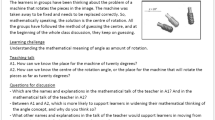Abstract
In this paper, we discuss the role and nature of pedagogic discourse. We argue that teachers’ talk plays a much more important role in students’ learning than is often considered—particularly in the learning of racially, ethnically, and linguistically diverse students. We present one teacher who has a record of assisting her fifth grade Latino students to make significant academic gains in mathematics, and we examine the way she uses her talk in teaching and how students in her class develop control over the mathematics discourse. To help make our point, we contrast this teacher with another teacher whose instructional talk is not as mathematically rich.
Similar content being viewed by others
References
Atweh, B., Cooper, T., & Kanes, C. (1992). The social and cultural context of mathematics education. In B. Atweh, & J. Watson, (Eds.),Research in mathematics education in Australasia (pp. 43–66). Brisbane: Mathematics Education Research Group.
Bakhtin, M. (1986).The dialogic imagination. Austin, TX: University of Texas Press.
Chval, K. B. (2001).A case study of a teacher who uses calculators to guide her students to successful learning in mathematics. Unpublished doctoral dissertation, University of Illinois at Chicago.
Chval, K. B., & Khisty, L. L. (2001, April).Writing in mathematics with Latino fifth grade students. Paper presented at the annual meeting of the American Educational Research Association, Seattle, WA.
Collier, V.P., (1995).Promoting academic success for ESL students: Understanding second language acquisition for school. Elizabeth, NJ: New Jersey TESOL — Bilingual Educators.
Cummins, J. (1994). Primary language instruction and the education of language minority students. In C. Leyba (Ed.),Schooling and language minority students:A theoretical framework (2nd ed., pp. 3–46). Los Angeles: Evaluation, Dissemination and Assessment Centre, California State University.
Elliott, P. C., & Kenney, P. (1996).Communication in mathematics, K-12 and beyond. Reston, VA: National Council of Teachers of Mathematics.
Erickson, F. (1996). Going for the zone: The social and cognitive ecology of teacher-student interactions in classroom conversations. In D. Hicks (Ed.),Discourse, learning, and schooling (pp. 29–62). New York: Cambridge University Press.
Friere, P. (1970).Pedagogy of the oppressed. New York: Continuum.
Gee, J. P. (1996).Social linguistics and literacies: Ideology in discourses (2nd ed.). London: Taylor & Francis.
Gee, J. P., & Clinton, K. (2000). An African American child’s science talk: Co-construction of meaning from the perspectives of multiple discourses. In M. A. Gallego & S. Hollingsworth, (Eds.),What counts as literacy: Challenging the school standard (pp. 118–138). New York: Teachers College Press.
Khisty, L. L. (1996). Children talking mathematically in multilingual classrooms: Issues in the role of language. In H. Mansfield, N. Putnam, & N. Bednarz (Eds.),Mathematics for tomorrow’s young children: International perspectives on curriculum. Boston, MA: Kluwer Academic Publishers.
Khisty, L. L., (1998, April).The ecology of interaction in the effective mathematics classroom. Paper presented at the Research Pre-session at the annual meeting of the National Council of Teachers of Mathematics, Washington, DC.
Khisty, L. L., & Viego, G. (1999). Challenging conventional wisdom: A case study. In L. Ortiz-Franco, N. Hernandez, & Y. De La Cruz, (Eds.),Changing the faces of mathematics: Perspectives on Latinos (pp. 71–80). Reston, VA: National Council of Teachers of Mathematics.
Krashen, S. D. (1994). Bilingual education and second language acquisition theory. In C. Leyba (Ed),Schooling and language minority students:A theoretical framework (2nd ed., pp. 47–78). Los Angeles: Evaluation, Dissemination and Assessment Centre, California State University.
Lockwood, A. T., & Secada, W. G. (1999).Transforming education for Hispanic youth: Exemplary practices, programs, and schools. Washington, DC: Centre for the Study of Language and Education, George Washington University.
Mercer, N. (1995).The guided construction of knowledge: Talk amongst teachers and learners. Clevedon, England: Cromwell Press.
Mohan, B. (1990). LEP students and the integration of language and content: Knowledge structures and tasks. In J. Gomez (Ed.),Proceedings of the first research symposium on limited English proficient student issues. Washington, DC: Office for Bilingual Education and Minority Language Affairs.
National Council of Teachers of Mathematics. (1989).Curriculum and evaluation standards for school mathematics. Reston, VA: NCTM.
National Council of Teachers of Mathematics. (2000).Principles and standards for school mathematics. Reston, VA: NCTM.
Pimm, D. (1987).Speaking mathematically: Communication in mathematics classrooms. New York, NY: Routledge.
Rogoff, B. (1990).Apprenticeship in thinking: Cognitive development in social context. New York: Oxford University Press.
Steinbring, H., Bartolini Bussi, M. G., & Sierpinska, A. (Eds.). (1998).Language and communication in the mathematics classroom. Reston, VA: National Council of Teachers of Mathematics.
Vygotsky, L. (1978).Mind in society: The development of higher mental processes. Cambridge, MA: Harvard University Press.
Wertsch, J. (1991).Voices of the mind: A Sociocultural approach to mediated action. Cambridge, MA: Harvard University Press.
Author information
Authors and Affiliations
Rights and permissions
About this article
Cite this article
Khisty, L.L., Chval, K.B. Pedagogic discourse and equity in mathematics: When teachers’ talk matters. Math Ed Res J 14, 154–168 (2002). https://doi.org/10.1007/BF03217360
Issue Date:
DOI: https://doi.org/10.1007/BF03217360




